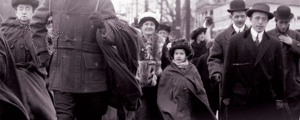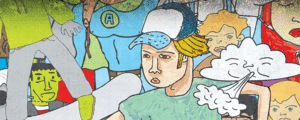
Who is #NextUP at SUNY Press?
Kate Seburyamo is a Senior Marketing Manager with SUNY Press
Happy University Press Week! UP Week is an annual celebration of excellence in university press publishing. Today the UP Week Blog Tour's theme asks who is #NextUP at your press! We’d like to take this opportunity to highlight two new staff members who joined SUNY Press in 2022, Malerie Lovejoy and Julia Cosacchi. We hope you enjoy these interviews with them and get to know two SUNY Press staff members who are making their mark on the UP world!
To start, what is your name and title?
Malerie: I’m Malerie Lovejoy and I’m the Database Entry Coordinator.
Julia: I’m Julia Cosacchi and I’m the Assistant Manuscript Editor.
What do you do at SUNY Press?
Malerie: I work on our internal database to maintain records on book projects throughout the publication process, for acquisition and transmittal, to updating warehouse records, to eventually sending author copies upon publication.
Julia: The Manuscript Editorial department serves as a bridge between Acquisitions and Production. We review accepted manuscripts and vet them for any potential issues with things like image file format, image and text permissions, missing documentation, etc. We also tidy up manuscript formatting to smooth the transition of the project into Production and ensure that all manuscripts conform to SUNY style and have all the necessary components to be able to move easily through the publication process.
What made you first consider a career in publishing?
Malerie: I’ve always been a big literature nerd in general, and I eventually realized that I had an eye for editing. This all added up to looking into careers in publishing, and I was able to intern with a university press in undergrad, where I discovered how much I enjoyed the environment of scholarly publishing in particular.
Julia: While in graduate school I had the opportunity to assist a number of faculty members with their book projects and in doing so had a chance to experience different aspects of the publishing process. I learned that my own skills and interests aligned well with the detail-oriented nature of the industry and I sought more opportunities to work on similar projects throughout my studies. I also worked as managing editor for an academic journal and from this learned even more about the development and publishing processes that help to shape and share excellent scholarship.
What appeals to you about working at a University Press specifically?
Malerie: To me, university presses and scholarly publishing in general are the perfect mental overlap between wanting to stay in school and stay connected to academia and wanting to enter the workforce and work in publishing.
Julia: I find that University Presses offer a special extra level of empathetic appreciation and understanding to academic authors whose projects reflect their scholarly passions and commitments. There’s also a shared sense of values across our staff that makes it an especially rewarding place to work.
What is one thing that you learned about working in publishing that surprised you?
Malerie: I think the thing that has surprised me the most is just the amount of work that goes into the actual production of a book. It was something I never focused on much because I’d been more interested in the editorial side of things, but the first time I heard someone talking about measuring specs for a cover, it just reminded me that there’s a whole side of publishing—the physical building of books—that I hadn’t considered as much.
Julia: That there isn’t any single path that can lead to working at a UP.
What is something that you hope to learn as you grow in your career?
Malerie: I hope I never run out of new ways to challenge myself in this field and continually look for new opportunities to grow my skills.
Julia: I’m eager to learn more about how other departments function and what skills and expertise are useful in those areas. Staff meetings are a great time to look at the big picture, which is a nice balance from my department’s focus on granular details of specific projects. When I have some extra time, I do assist with some Production tasks which help me to see and appreciate some of the behind-the-scenes work they do. I’m also starting to learn more about Open Access publishing and am eager to both work and think through the ways that scholarly publishing can continue to adapt to the changing needs of authors and readers.

